![]()
Sunday, February 26, 2017 | By Dr. Raz Zimmt
Originally published by the Meir Amit Intelligence and Terrorism Information Center.
Overview
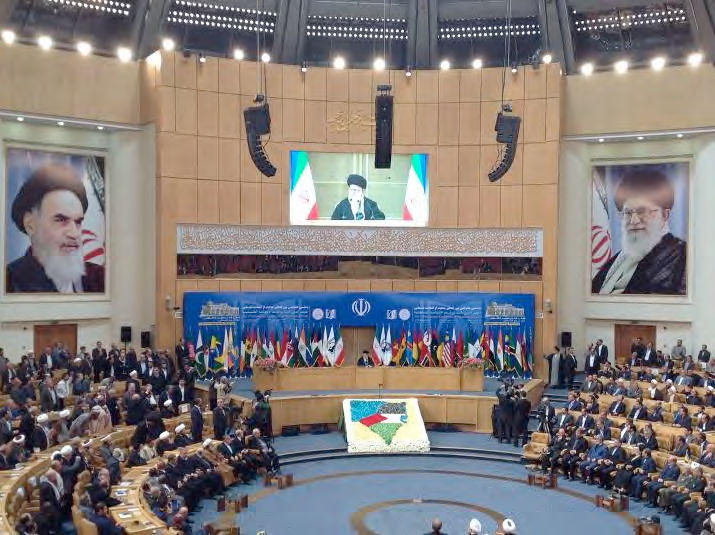
Supreme Leader Ali Khamenei delivering his speech at the conference (Tasnim News, February 21, 2017)
On February 21-22, 2017, the Sixth International Conference on Palestinian Intifada was held in Tehran. The conference has been held since 1991 in accordance with the “Law on the Support of the People of Palestine’s Islamic Revolution” passed in the Iranian Majles in April 1990. So far, the conference has been held five times (in 1991, 2001, 2006, 2008 and 2011). About 700 delegates from eighty countries attended the conference, including parliament members from the region and elsewhere and NGO activists. Among the attending parliament members were the speakers of the Syrian, Lebanese and Iraqi parliaments, parliament speakers from several African countries, the speaker of the North Korean parliament, and the deputy speaker of the Russian parliament. Prominent among the participants were representatives of Middle Eastern terror organizations such as Hezbollah, Hamas, and the Palestinian Islamic Jihad (PIJ).
At the background of the conference this year are the tension between Iran and the new American administration; the vehement Israeli statements against Iran; and the reports of rapprochement between Israel and several Sunni Arab countries, mainly Saudi Arabia, which is leading the regional anti-Iranian axis. Similar to the “Global Jerusalem Day” which has taken place in Iran every year since 1979, the Conference on Palestinian Intifada was intended to express Iran’s support for the Palestinian cause and the “Liberation of Jerusalem” as the main component of the Iranian aspiration for regional hegemony. Like every year, this year as well, the conference served as a podium for blatant incitement against Israel, calls for the elimination of the State of Israel, and inflammatory rhetoric against the countries of the region which are willing to recognize Israel and maintain relations with it. Israel was portrayed by Supreme Leader Ali Khamenei as a “malignant tumor” which developed in stages and therefore should be dealt with gradually. This “malignant tumor” should be dealt with through the Palestinian Intifada (i.e., by violence and terrorism) until the annihilation of the State of Israel (the “complete liberation” of Palestine).
Holding the conference in Tehran expresses once again the Iranian hostility toward Israel, which is still a major component of the regime’s ideology. The nuclear agreement not only failed to bring about a change in Iran’s policy toward Israel, but to a great extent encouraged the Iranian regime to emphasize even more its hostility toward Israel as one of the symbols that it uses to prove its adherence to the values of the Islamic Revolution.[1] Holding the conference at the present time also provided Iran with the opportunity of demonstrating to the United States and the countries of the region its regional leadership and mobilizing public opinion from within and without through the outspoken hostility toward Israel and the support of the Palestinians.
The conference
Overview
The conference was chaired by Iranian Majles Speaker Ali Larijani. It was opened by Supreme Leader Ali Khamenei’s speech, and closed by President Hassan Ruhani’s speech. In their speeches, the leaders of the Iranian regime lashed out against Israel and its policy against the Palestinians and called for the continuation of “resistance” until the “complete liberation of Palestine” (i.e., the annihilation of the State of Israel). The Iranian speakers emphasized Iran’s commitment to continue its support for the Palestinians and their struggle. They criticized the willingness of some of the countries of the region to maintain relations with Israel and warned against deflecting the Islamic and Arab world’s attention from the Palestinian problem to the internal crises faced by the region.
Shortly before the opening of the conference, Kazem Jalali, the spokesman for the conference and member of the Majles Committee for National Security and Foreign Policy, explained the importance of holding the conference at the present time due to the deflection of the Islamic world’s attention to regional issues, and the decrease in the importance of the Palestinian issue in the regional list of priorities. According to Jalali, while Israel continues in its oppression of the Palestinians, its siege on Gaza and policy of settlements, part of the Arab countries are willing to establish ties and normalize their relations with it. He said that convening the conference under these conditions was intended to stress that the Palestinian issue should be placed on top of the Muslim world’s priorities and that internal differences of opinion and religious struggles among the Muslims should be abandoned in favor of Muslim unity in the struggle against the “Zionist regime.” Jalali added that the conference would discuss the methods of the struggle against the Zionists’ efforts to Juidize Jerusalem, especially in view of President Donald Trump’s statements on moving the US embassy to Jerusalem (ISNA, February 18, 2017).
Participation of representatives of the Palestinian organizations and Hezbollah
Hezbollah and the Palestinian terrorist organizations attended the conference in Tehran. Hezbollah was represented by Deputy Secretary-General Sheikh Naim Qassem. Among the Palestinian organizations, prominent were Ramadan Abdallah Shalah, the leader of the Palestinian Islamic Jihad (PIJ), a terrorist organization supported by Iran and maintaining close ties with it. Other organizations settled with delegations including senior echelons. The Lebanese Al-Akhbar daily reported that Egypt had prevented Hamas’s Gaza Strip delegation from traveling through its territory. The delegation was originally headed by Mahmoud al-Zahar and Khalil al-Hayya, and included over 35 other Hamas operatives (Al-Akhbar, February 21, 2017). Faute de mieux, Hamas eventually sent a lower-ranking delegation, which included Khaled al-Qadoumi, Hamas’s representative in Iran, Osama Hamdan, who is in charge of Hamas’s external relations, Sami Abu Zuhri, Hamas’s spokesman, and Ali Baraka, Hamas’s representative in Lebanon (alarabpost.com, February 21, 2017). On behalf of Fatah, Central Committee member Abbas Zaki was sent to represent the organization, as well as Salim Zanoun, chairman of the PLO’s Palestinian National Council (alarabpost.com, February 21, 2017).
Following are several outstanding statements:
- Ramadan Abdallah Shalah, the PIJ leader, praised the “resistance”(i.e., terrorist organizations) in the Gaza Strip which stood fast during three wars against Israel. He added that the Palestinians would strive to develop the capabilities of the “resistance” and its weapons. He lashed out against the Palestinian Authority and described it as a governance authority which does not represent the Palestinians but works to maintain Israel’s security, defending the settlements and undermining the “resistance” (Pal-Info, February 21, 2017). His statement was denounced by Fatah, which described it as “irresponsible” (Safa, February 21, 2017).
- Osama Hamdan, who is in charge of Hamas’s external relations and serves as Hamas’s representative in Lebanon, gave a speech at the closing ceremony of the conference. He praised the “resistance” (i.e., the terrorist organizations) which, according to him, succeeded in defeating Israel in all the wars in the Gaza Strip. He also praised the so-called popular terrorism (Al-Quds Intifada) which, as he put it, expressed the heroism of younger Palestinians. He called for the escalation of the “resistance” and strengthening of the Gaza Strip as a “basis for the resistance” through the supply of weapons and measures to support steadfastness in the Gaza Strip (PalToday Channel, February 22, 2017).
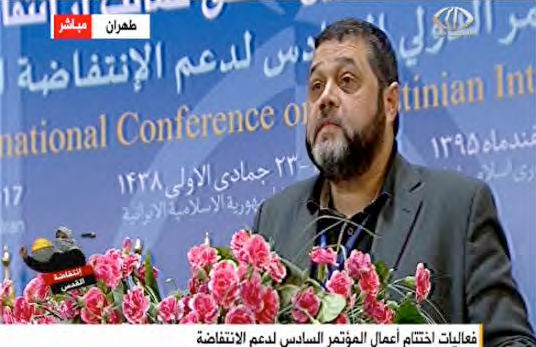
Osama Hamdan, who is in charge of Hamas’s external relations and serves as Hamas’s representative in Lebanon, delivers a speech at the closing ceremony of the conference in Tehran (PalToday Channel, February 22, 2017)
- Hezbollah’s Deputy Secretary-General Sheikh Naim Qassem said that Palestine would be “liberated” step by step through the “resistance.” He pointed out that Hezbollah is the solution, and that the organization recognizes only one Palestine whose capital is Jerusalem. He said that Iran hadn’t ceased supporting the Palestinian people and its intifada despite all pressures. At the end of his speech, he stressed that the Palestinians are the spearhead of the struggle against Israel and should be assisted and joined (Al-Ahed, February 21, 2017).
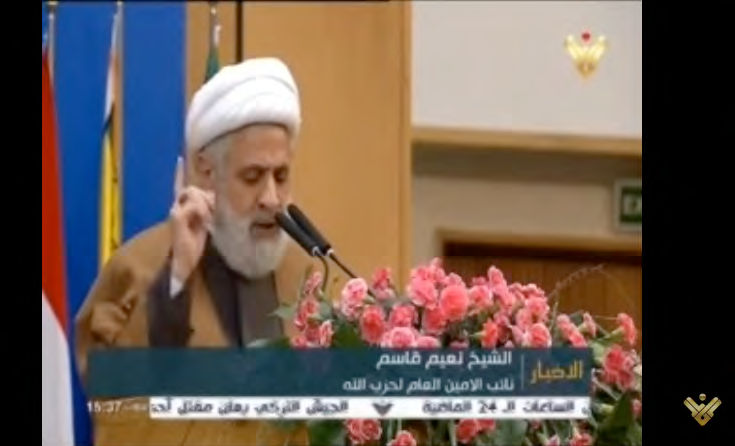
Hezbollah Deputy Secretary-General Sheikh Naim Qassem delivers a speech at the conference (YouTube, February 21, 2017)
The closing announcement of the conference and a propaganda campaign on social media
Following are the main points of the closing announcement of the conference:
- The participants of the conference pointed out the need to place the Palestinian problem on top of the priority list of the Muslim world and the Arab countries. The closing announcement recognized the “resistance” (i.e., terrorism) as the only way to realize the “legitimate rights” of the Palestinian people and portrayed the intifada as the only way to struggle against the “occupation.” The conference participants called for employing all means to support the Palestinians, the continuation of the efforts to put an end to “seven decades of Zionist occupation”, working towards solving the internal crises and struggles in the Muslim world, and demanding from the international community to exert pressure on Israel to put an end to its “inhuman” behavior.
- The announcement pointed out the “right of return of the Palestinian refugees to their own country,” called on Arab and Muslim countries to close down their embassies in the United States in the event of the transfer of the US embassy to Jerusalem, called on all countries to sever their relations with Israel and boycott Israeli products, and demanded that parliaments in the Muslim and Arab world pass a legislation preventing the establishment of any relations with the “Zionist regime” (Tasnim, February 22, 2017).
Propaganda campaign on social media
While the conference was underway, supporters of the Iranian regime initiated a propaganda campaign on social media under the name “All for Palestine.” As part of this campaign, Iranian and Muslim Internet users posted their comments under the hashtag #All4Palestine in Arabic, Persian and English (Mehr, February 20, 2017). Comments included calls for the liberation of Palestine, expressing support for the Palestinian “resistance” and intifada, quoting declarations by the Iranian Supreme Leader according to which Israel will cease to exist within 25 years, and calls for the elimination of Israel.
Appendix: Statements by Senior Iranian leaders at the conference
Supreme Leader Ali Khamenei
In the opening speech of the conference, Supreme Leader Ali Khamenei referred to the crisis in the region. He said that crises in some countries of the region had led to diminishing support for the Palestinian problem and for the sacred value of the Liberation of Jerusalem. Those who forced the “Zionist regime” on the region so as to undermine its stability are the ones behind the internal struggles in the region. The enemies of the Muslim nation have managed to force internal wars on the peoples of the region and weaken the status of the Palestinian problem. In spite of the internal differences of opinion among the Muslim countries, Palestine can and should serve as the axis of unity for all Muslim countries. One of the achievements of the conference is in the declaration that the Palestinian problem is the top priority of the Muslim peoples and freedom seekers. The Muslim peoples should jointly act for the liberation of Palestine.
According to Ali Khamenei, the Palestinian people has no other choice but to maintain the flames of struggle as they have done so far. The intifada, which broke out in the occupied territories for the third time, is moving forward, and with Allah’s help will be able to force another defeat upon the occupying regime. According to Khamenei, the “malignant tumor” (i.e., Israel) evolved in stages, and dealing with it should also be gradual. Several intifadas and ongoing resistance managed to achieve several important goals, and the Palestinian intifada will continue until the complete liberation of Palestine (i.e., the annihilation of Israel). The “illegitimate” existence of the “Zionist regime” is based on the destruction of the identity and existence of Palestine, and therefore, maintaining the Palestinian identity is essential and represents a holy war (jihad).
Khamenei ruled out any possibility of compromise with Israel, and criticized those who challenged the “way or resistance” (i.e., terrorism) arguing that it hadn’t brought about the liberation of Palestine. He noted that even though the “resistance” did not succeed in bringing about the complete liberation of Palestine, it did manage to keep the Palestinian problem alive. The most important achievement of the “resistance” is blocking the “Zionist projects” and thwarting the major plan of the “Zionist regime”, which is to take over the entire region. According to Khamenei, if it weren’t for the “resistance,” the Zionist aggression would also spread to other countries in the region: from Egypt to Jordan, from Iraq and the Persian Gulf to other regions. The “resistance” brought about the liberation of south Lebanon and Gaza, thereby blocking the process of geographical expansion of the “Zionist regime.”
Khamenei pointed out that one shouldn’t ignore the dangers inherent in the presence of the “Zionist regime” in the region. Therefore, all the peoples and governments in the region should cater for the Palestinians’ needs. Implicitly criticizing Hamas’s position toward the civil war in Syria and the war in Yemen, Khamenei called on the Palestinians to learn from the past and avoid interfering in the differences of opinion among Muslim and Arab countries. He also addressed the internal struggles among the Palestinians and said that the existence of differences of opinion among the Palestinian groups is natural and understandable, but they should not lead to confrontations and fierce struggles which serve the enemy’s interests. National unity on the basis of the jihadi plan is a national requirement for Palestine.
According to Khamenei, the “resistance” is currently facing a new conspiracy, which is the attempt to derail it from its course and sell it to the enemies of the Palestinian people by establishing clandestine relations with them. However, the resistance will not fall into this trap because the Palestinian people is able to prevent that. Even if one group lays down the banner of “resistance,” another group will rise from among the Palestinian people and raise it again (Supreme Leader’s website, February 21, 2017).
Iranian President Hassan Ruhani
In the president’s speech, closing the conference, Hassan Ruhani said that the Palestinian problem is not a problem of one people but an expression of oppression, violation of international rights, and impotence of international institutions. He noted that Palestine is a symbol for a people’s ongoing efforts to realize its rights.
Ruhani warned against Israel’s efforts to normalize its relations with the Muslim worldso that its crimes in Palestine and the Muslim countries would be forgotten. He noted that the Zionists consider wars and internal differences of opinion among the Muslims a historic opportunity to render the Arab states supporting Palestine from enemies into allies against the resistance and its main supporter, Iran. The Muslim world should be clear on its stance about normalization with Israel and explain whether the leaders of the Muslim world are leaders of the Muslim nation or part of the trend of normalization with the occupiers and oppressors.
The president noted that Israel’s most important goal today is to present the current conditions as natural. The Zionists want to convince the world that the Palestinians are refugees who should live without a territory and that resistance is terror. “The fake regime” (i.e., Israel) holds some of the Western leaders as hostages operating as if every struggle against Israel compromises the vital interests of the United States and Europe.
Ruhani reiterated Iran’s official position, according to which establishing just and comprehensive peace in the Middle East is only possible through the end of the occupation of Palestine and the full implementation of the Palestinian people’s rights, including the right of self-determination, the return of all Palestinians to their lands, and the establishment of a unified government in Palestine, with Jerusalem as its capital, through a referendum among the original inhabitants of historic Palestine. He pointed out Iran’s unconditional support for the Palestinians and their struggle (ISNA, February 22, 2017).
Majles Speaker Ali Larijani
In his speech at the conference, Larijani said that the support for the Palestinians is anchored in the Iranian constitution and in the political legacy of the founder of the Islamic Revolution, Ayatollah Ruhollah Khomeini, who emphasized the support for the Palestinian people and the struggle against “arrogance” (i.e., the West) and the “region’s malignant tumor” (i.e., Israel).
According to Larijani, the Palestinian people is currently facing double oppression: on the one hand, the “Zionist regime” increases its pressure on the Palestinians and continues its settlement policy in the West Bank and Jerusalem. On the other hand, the “Zionist regime” is working to deepen the internal differences of opinion among the Muslim world and increases its penetration into the countries of the region, so as to make them replace their main enemy, which is Israel, with another imaginary enemy (Fars, February 21, 2017).
Chief of the Judiciary Sadeq Amoli Larijani
In a speech delivered on the morning of the second day of the conference, Larijani said that the Palestinian problem is not limited to any particular geographic territory but is related to the entire Muslim world, as it reflects an ideological struggle between Islam and a Western liberal-democratic worldview supporting the “Zionist regime.” He referred to the large economic and military support which the United States extends to Israel as indicative of the West’s support for Israel as part of its comprehensive struggle against Islam and its aspiration to impose its liberal worldview on the region. Larijani accused Israel of committing war crimes against the Palestinians and said that Israel’s policy in the occupied territories is a test for the Western commitment to human rights.
![]()
Note:
[1] For further details, see the ITIC’s Information Bulletin from October 13, 2016: “Hostility towards Israel continues to be a fundamental element of Iranian foreign policy,”.



 RSS
RSS

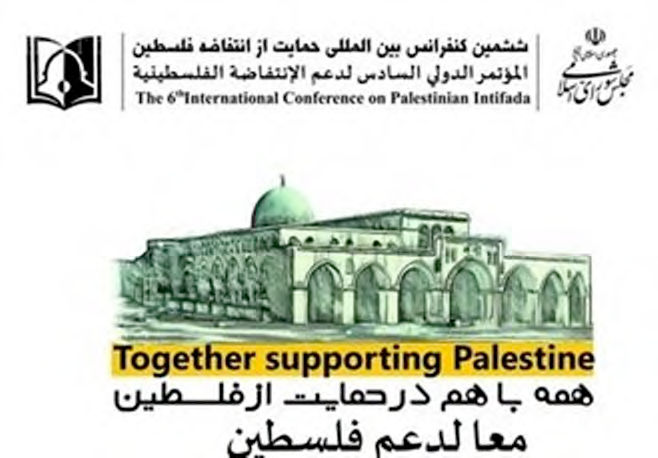
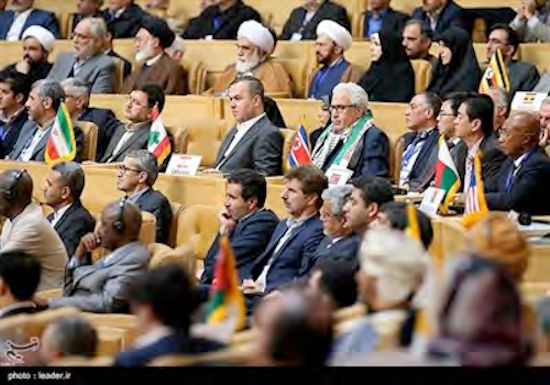
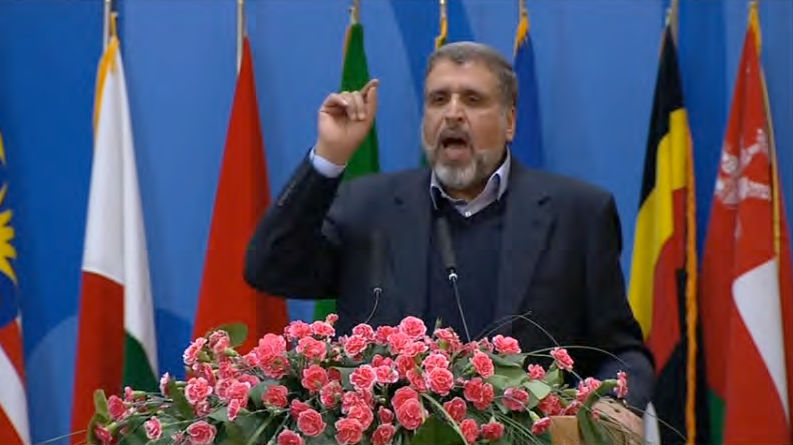
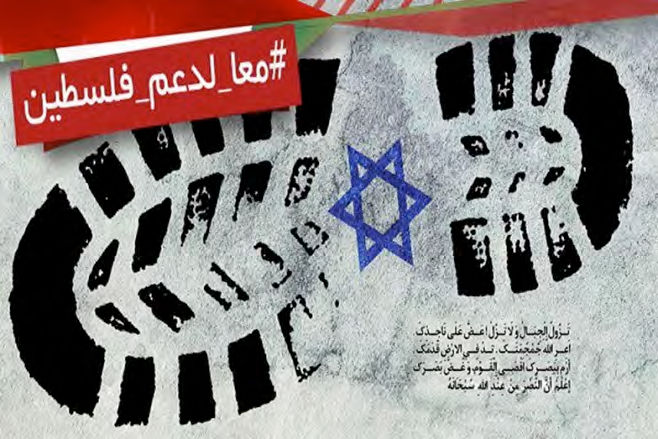
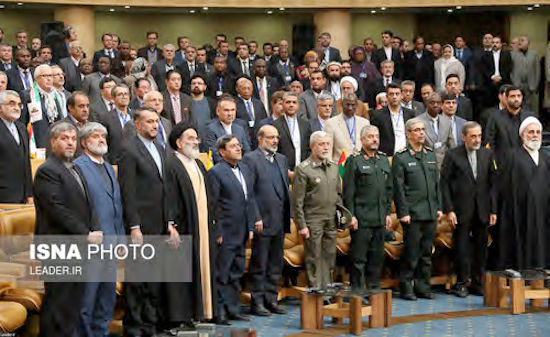
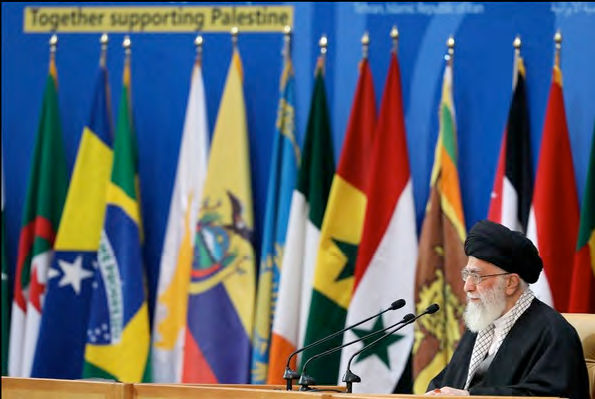
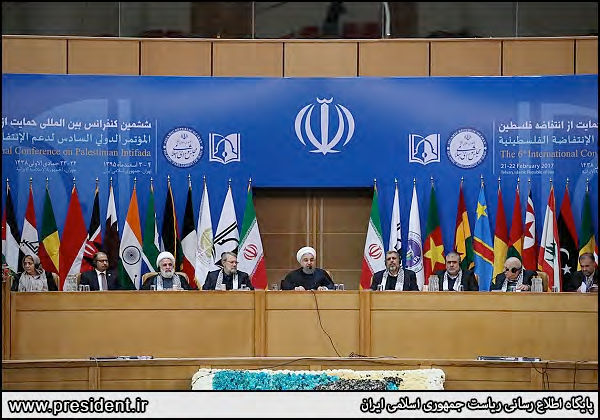
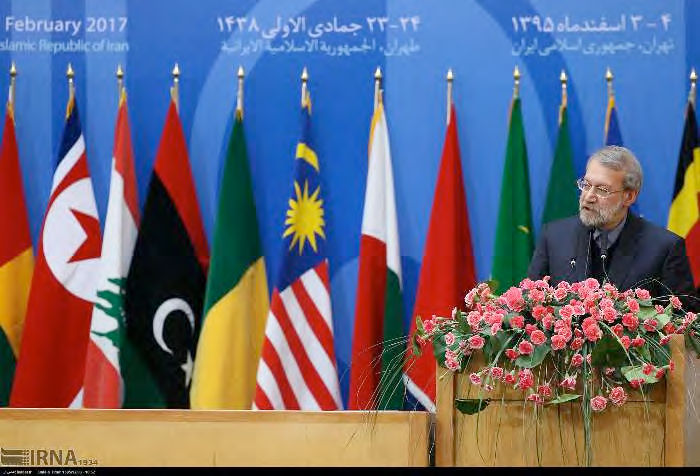
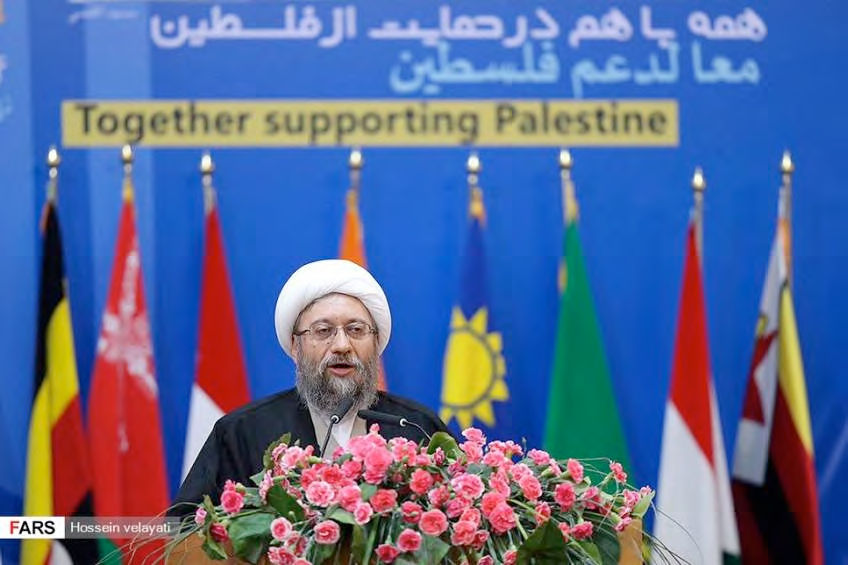
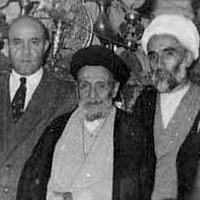
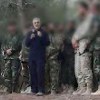
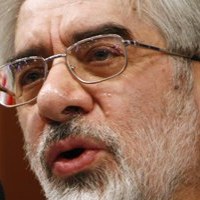
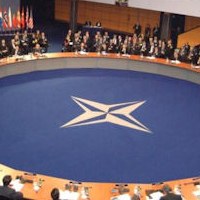
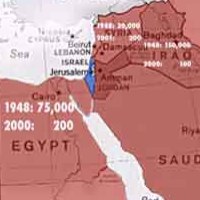




Latest Comments
Hello Mike, Thank you for your positive feedback to the article. I felt there wasn’t too much critical analysis of ...
Thanks for this considered and well constructed article. A follow up article on the manner in which the editorial contro...
THE CLUELESSNESS OF CLAIMING THAT OBAMA'S MIDDLE EAST POLICIES WERE A FAILURE CANNOT BE FURTHER FROM THE TRUTH, WHAT THE...
As long as Obama is the president of the usa do not trust the us government......
Thank you for an good read....